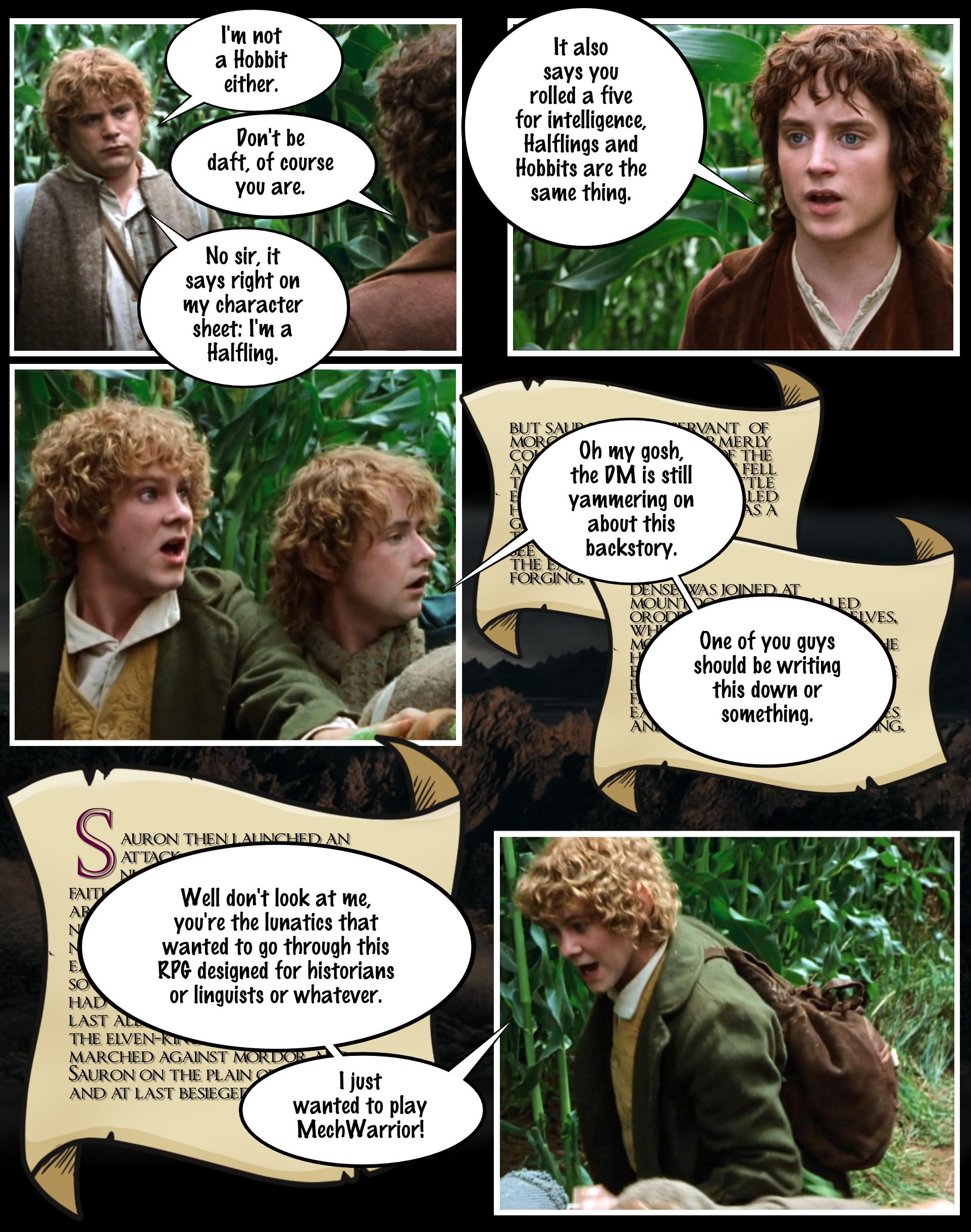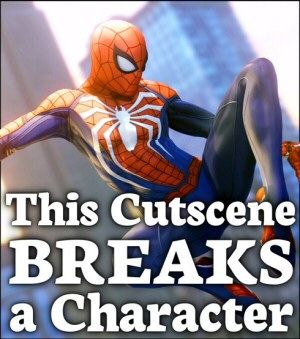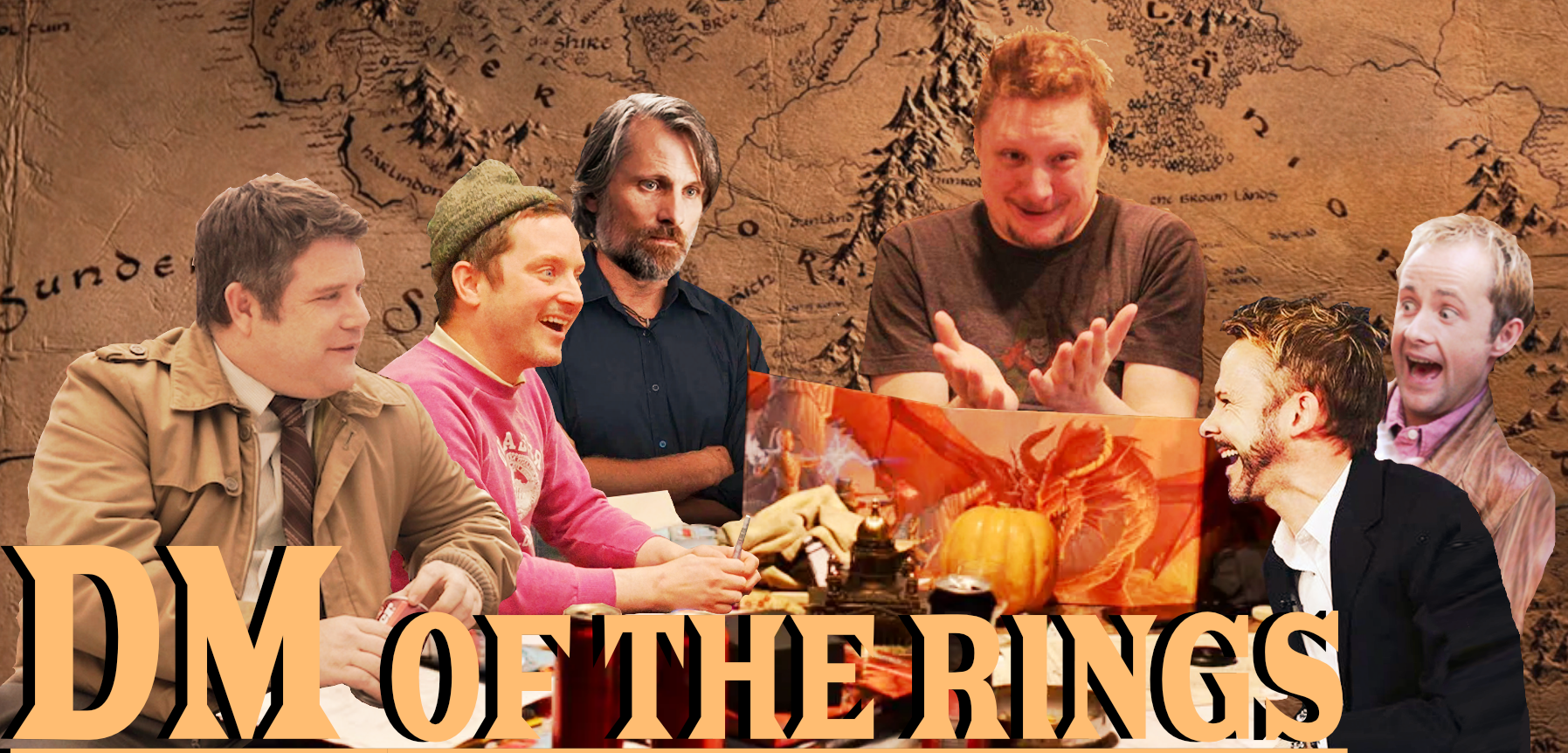
Lord of the Rings is more or less the foundation of modern D&D. The latter rose from the former, although the two are now so estranged that to reunite them would be an act of savage madness. Imagine a gaggle of modern hack-n-slash roleplayers who had somehow never been exposed to the original Tolkien mythos, and then imagine taking those players and trying to introduce them to Tolkien via a D&D campaign.
– Shamus, Thursday, Sep 7, 2006
Geez, and I thought Steam Rewind was a kick to the emotional balls, this shit makes that shit look like a cakewalk. Man, it would be so much easier not to miss him so god damn bad if he was less funny and awesome. Damn it Dad!
I don’t have much to say on the ‘I remember this strip!’ line of thought, yet. I will later, I do remember him working on some of these, but I was eight when this first strip came out and was probably busy committing minor felonies and picking my nose. Ah, childhood.
I can say I do remember his actual D&D campaigns from around this time. If, that is, by remembering I mean vaguely recalling dad having some old as-the-hills Early twenties. losers My uncles and their friends. come over once a week Month? Year? IDK man, at that point I think I was still measuring time in Veggie Tales episodes. and shouting a whole lot. They ate a lot of Combos and drank a lot of Mountain Dew. I wanted nothing more than to be at that table with them, but apparently, that particular table was deemed ‘not-child-appropriate’, rude ENTIRELY CORRECT..
This weeks French comic can be read here.
Footnotes:
[1] Early twenties.
[2] My uncles and their friends.
[3] Month? Year? IDK man, at that point I think I was still measuring time in Veggie Tales episodes.
[4] ENTIRELY CORRECT.
Crysis 2

Crysis 2 has basically the same plot as Half-Life 2. So why is one a classic and the other simply obnoxious and tiresome?
Mass Effect Retrospective

A novel-sized analysis of the Mass Effect series that explains where it all went wrong. Spoiler: It was long before the ending.
Revisiting a Dead Engine

I wanted to take the file format of a late 90s shooter and read it in modern-day Unity. This is the result.
The Best of 2018

I called 2018 "The Year of Good News". Here is a list of the games I thought were interesting or worth talking about that year.
This Scene Breaks a Character

Small changes to the animations can have a huge impact on how the audience interprets a scene.
 T w e n t y S i d e d
T w e n t y S i d e d

Familiar as I am with the tropes of D&D I never played the game myself. By the time I got the kind of friends who would be interested in it our jobs would make it very hard to engage with it even once a month.
There is always the present. There are always new groups of friends to make. There is always a better game system…. (like GURPS)
I first got into RPGs via *The Dangerous Book For Boys*, which had a short essay on them that got me hooked. After that I tried making a cargo cult version of an RPG in Microsoft Excel of all things, before my family all went to a con in Massachusetts. It was love at first sight, and what inadvertently led me here about a decade ago.
Ironically, there was a complicated history behind this. Allegedly (from what I’ve read from second-hand comments), Gygax was NOT that fond of the multi-racial elements and wanted a human-centric world based upon Sword and Sorcery books like Conan and Fafrd and the Grey Mouser. This is why the basic gameplay of looting tombs for gold and gems resembles these novels more than Tolkien. That’s apparently also why “demi-humans” had level caps that made them somewhat inferior in play to humans.
It’s funny how most of the D&D settings are human-centric, yet the typical adventuring party is an elf, a catperson, a pixie, a floating pile of rocks and a sentient necktie. I have to introduce custom rules just to make human characters interesting and mechanically viable.
Introducing custom rules is interesting because in most editions of D&D, humans are already almost completely mechanically superior to other options at the table. It’s just that, in most tables I’ve played at, people want to play as the cool weird fantasy people and see humans as the “boring default” option.
Yeah, seconded. In most RPGs I’ve played, Humans are mechanically perfectly viable*. D&D in particular portrays them as ‘adaptable’, giving them extra skill points or bonus feats so they can start off with a bit more than other races.
But in a world of magical fantasy, why be a human when you can be so many other weird and wonderful things?
*though as always, if you want the most powerful race, just go with whatever’s been published latest. The Power Creep is real.
There seems to be an interesting divide between people who, upon being given the chance to experience a fantastical world in a game (tabletop, video, whatever) want to do it as a human, and those who want to do it as anything but. (I fall more into the latter camp.) AAA (video) games, in my experience, seem to skew heavily towards the former camp, which is probably at least partly why I’ve never been all that interested in them.
Humans are generalists in a system that rewards specialisation. They’re only superior if you’re going for a weird multiclass character and need the attribute spread.
To sour the deal, 5e makes humans one of the few races to lack darkvision. If your DM plays by lighting rules, that makes them unviable for dungeon diving, exploring the wilderness and going outside at night. I hope your game is set in the Elemental Plane of Fire.
In return, you get… a feat. Feats in 5e are good but they’re not that good.
I’d say this is more a problem of 5e giving everyone and their dog darkvision rather than humans being bad; devaluing the ability rather than making humans bad. I’ve never seen it actually matter that much in-game, I think because most DMs don’t bother since almost everyone can ignore it.
Meanwhile, most min-maxers I know love the idea of extra feats. To each their own, though.
Agreed – earlier editions had a nice combination of normal vision, low-light vision, and a few instances of darkvision. It made darkvision feel actually special, with most people requiring light sources, even if some of them could see farther out than others. Now though, with everyone having darkvision by default, it makes *not* having darkvision feel like a disadvantage. Though it’s one that can be easily mitigated or worked around between spells, magic items, and class abilities, and more often than not is ignored by the GM anyway – typically I see them assuming people have some kind of light and not paying attention to it or working with it.
And even when you do play by lighting rules, sources of light are cheap and readily available even at low levels, and have similar range to the maximum range darkvision has. It’s really not that big a disadvantage even playing strictly RAW.
And feats are considered very good, yeah. Most builds have a couple feats that are basically required, martial characters especially, and being able to get one right away without giving up a stat increase is a *huge* advantage.
Actually, if you’re playing by lighting rules, then everyone who has Darkvision still has Disadvantage on Perception checks while in the dark, so it’s best just to have a light source anyway.
Stock human is a generalist, the variant human you mention with the feat is *whatever specialist you need*. Every race basically starts with a feat’s worth of abilities, the only difference is that a human gets to choose while everyone else gets their racial package diluting the part you want with a bunch of tiny bonuses that won’t come up.
Granting every race the ability to freely assign their stat bonuses is what makes it possible to not play humans effectively, especially for those races previously locked to a stat spread like Int/Cha. Otherwise you’d find something you like, see it only really matches a build you don’t care about, and then either play a human or brush up on your “it doesn’t matter if I play this game making poor decisions if I’m intentionally doing so for the story” speech.
I believe every caster gets Light as a cantrip, an at-will ability granting light without needing a hand to carry for an hour without fuel. Light is not an issue.
Ooh, the recent changes to racial stat bonuses in D&D is worthy of being its own article, I think. Bet there’s a lot of people who’d have opinions on it.
I’m mixed. On the one hand, it takes away the ‘character’ of a race. If a dwarf can be as dexterous and charismatic as an elf – and an elf can be as strong and stocky as a dwarf – you’ve just flattened the two races (and all the others) into a homogenous pile in a way. As someone in my D&D group said, ‘everyone’s just a Variant Human.’
On the other hand, having different races excel at different thing leads to it’s own homogeny. It’s not just that Wood Elves make good Rangers – it’s that if you’re playing a Ranger and you’re NOT a Wood Elf (or other race with stats that fit the class), you’re playing a substandard Ranger.
Of course dwarves are mostly fighters, anyone who wants play a fighter will naturally pick the race with strength and constituton bonuses.
(Yes, these examples are very simplistic and the actual rules and subraces are a lot more flexible than described. But you get the point.)
Which is better? Discuss!
Better, I don’t know (not even sure what that means in this context). I definitely prefer the new way though.
I have found I really prefer to define cultural/societal characteristics more than racial (species) ones. Giving fun physical quirks/special abilities I don’t mind so much (flight, waterbreathing, chitinous plates, etc), but ability scores are sort of the core definition of a character’s capabilities, and especially with “mental” stats, assigning bonuses by species feels weird and kinda problematic.
I think part of the problem here is the move from rolling random stats to “point-buy” type systems, and exacerbated by the overall move from disposable characters to people being expected to stick with one character for a long time with character death ranging from “rare Major Event” to “literally not on the table.”
If you’re rolling random stats, it’s always possible that your stat rolls are outside the “normal” bounds and so while Wood Elves are statistically more likely to be good rangers, it’s always possible you got weird rolls with your Human and could just roll with it. But if I get to min-max my stats and picking a race is part of that then it does create the feel-bads you describe if I don’t want to be an Elf but do want to be a Ranger.
I think that’s definitely part of it. If I’m rolling stats, I might get a fantastic stat or two, but a couple of really low rolls, and in those cases using the bonuses from a race to shore up the weaknesses might feel a lot better than pushing up an already excellent stat a bit better. I think I’ve felt more restricted in build choices on point buy tables specifically because of that, especially ones with prebuilt arrays – if my highest possible stat is 15 before bonuses, it feels awful to build a character without boosting that by at least one.
Character deaths falling by the wayside could be a conversation all by its own, it’s an interesting cultural shift to watch. If nothing else, it feels *weird* to be at a table and see the DM doing mental math and obviously fudging rolls to keep my character from dying – or even dropping below 0 to begin with. I don’t know if it’s actively worse, but it’s definitely Different.
Ehhh, in my experience fudging stuff to keep characters alive this was much more of a thing with the “tactical” RPGs (depending on the players and the GM of course). Players would get attached to characters, killing a character mid-adventure (or mid-dungeon) and then spawning another one if you wanted to do it in a narrative way could be annoying to work in, if GM had plot hooks that were relevant to the campaign hanging on that character than it would require even more gymnastics… To be clear, I’m not saying there is no room for quick death style of play if that’s what people want to play, but nowadays I lean a bit more towards the narrative side of things so I prefer it when systems make it difficult to kill PCs unless that’s specifically desired.
I guess we’ll have plenty of opportunity to talk about PC death when we get to Boromir (spoilers for LotR!)
That’s the thing. It sounds hardcore to say “no fudging, character deaths are for real here”, but in practice that means you will often have to stop the game, let the player roll up a new character that has a good chance of looking like the old one, and then squirm to handwave the role-playing of why the group is trusting this new guy that just showed up (“I see your party has no wizard”).
It made more sense when there was very little choices in character creation. If your Fighter died, you created a new one by picking a race, rolling the stats and that was almost literally almost all of the decisions you had to make so it would take just 5 minutes.
I started playing with point buy systems, and while I *have* rolled for stats, I don’t like it. Hey, let’s have the entire party start out on an unequal footing – that’ll be fun!
I get why other people do it, but it’s not for me.
Weirdly, the thing I like most is when a GM giving players (really generous) stat arrays. If my character can start with 18 in their most relevant ability score, they’re basically sorted*. Whenever an ASI roll around, it actually feels like a choice. ‘You know what? My casting stat’s fine. Let’s see what fun feats I can take instead!’
Without it, it’s often turns into a calculation, rather than a choice. Of course I’m giong to take +2 to [class relevant ability], I feel like I have to.
*Also relevant: I love the way D&D 5e caps ability scores at 20. I’m playing a Pathfinder computer game at the moment and the numbers seem to just snowball out of control, especially at high levels.
That’s giving me flashbacks to many games I had and my incredibly “lucky” dice rolls. One in particular when I started university and The Dark Eye with a new group. No one would believe me beforehand, until the DM had to allow me to reroll a character five times, until I had the stats to become anything but a peasant :D
One thing I would do (without telling the PCs to avoid Meta thinking) that wanted to roll would be a “Share the Wealth*” where I would let people swap out their highest roll for the highest roll of any of the players. So, if someone gets straight 17s and someone gets straight 14s, the latter is going to have one of those 14s turned into a 17. Since they’re almost always going to put it into their main attack stat anyway, it avoids the issue of “this person is literally better in combat than me even though we’re the same role” and relegates the inequalities to bonus HPs and skill modifiers.
*Yeah, theoretically this could screw a person who rolled a 20 with a bunch of 10s compared to the second player who rolled straight 14s, but so far the rolls came out pretty consistently good or bad.
Ah, I’m playing X:Beyond the Frontier (the old one, the OG) and it’s like:
-Teladi: basically Ferengi, all are hypercapitalists, profit is king
-Boron: all pacifists who just want to chill in their oceans and waterfilled space stations
-Split: basically Klingon, all about being a mighty warrior, hate weakness of any kind
-Paranid: fanatical theocrats
-Argon, the only ones who look like humans: a complex society of multiple factions with different ideologies and motivations (it only matters somewhat in the game)
On a more serious note I think having variety in cultures or races, even to a point of archetyping, can be useful and interesting, if I’m playing or running a game with a mobile party I want them to experience different things, not every town of similar size being a carbon copy of the previous one, not every court, tradesman guild or criminal organization being the same. Having said that just because Britain was a mighty seafaring empire expecting every citizen to know how to swim and be good at climbing ropes is ridiculous, not to mention occasional Unfortunate Implications* that could happen, or if you want to be more humorous about it high elves may all be regal and fancy but someone still has to clean the toilets. Furthermore, PCs have every right to be outliers, just as much as they can be archetypes, nowadays even in a setting fairly rigid about racial mechanics I’d probably allow a player to make a “non-standard” character if the concept was solid enough, unless there was something inherent in the setting preventing it (and even then, with good justification…).
*Ye olde Drow weren’t grey-to-obsidian-black skinned, they were very much… brown… with huge hair, and the ladies wore a lot of leotards so… yeah. Just in case I’ll remind you that this is (particularly at this point) universally evil race of bloodthirsty enslaving matriarchy.
Would you be so kind and sort the DM of the Rings Remaster into its own category? That makes it much easier to click through later, plus I would love to send the link out and don’t want newbies to get lost on the way between the episodes.
Yup, my bad. It was in its own category, and also the epilogue category. So, it was confusing the system. Fixed now, thank you so much for pointing it out!
Oh boy, I never had a chance to read DM of the Rings back in the day – the first of Shamus’ stuff I saw was his Escapist stuff, and I didn’t really start following him regularly until the Mass Effect retrospective – and I just didn’t get around to binging the series. This’ll be a good chance to finally read through it, and on a release schedule instead of whenever I remember to read a bunch at a time.
It’ll be interesting too, I did read quite a bit of Darths and Droids, which took a lot of inspiration from this, to see where stuff like that was coming from.
This is fantastic! DMotR brought me here way back in ’08 and it’s time for the annual re-read.
The OG campaign only began because the former DM botched it so bad we needed a new one. Shamus, having never DM’d anything before, ever, volunteered.
But I actually did just want to play Mechwarrior……true story.
…For all this time I somehow missed that this was actually based on real events. Wow.
Bay, it seems like some commas in the new version were actually periods in the original? The one in the second panel, for example.
Did Shamus DMed? maybe you can find his old notes… they probably played AD&D or 2ed… this was around 3.5 but I doubt they played that by the age of the group.
I wonder if Shamus’s D&D campaigns had you walking through lots of farmland. I mean, people do need to eat… :)